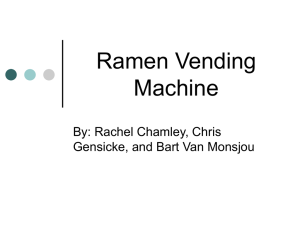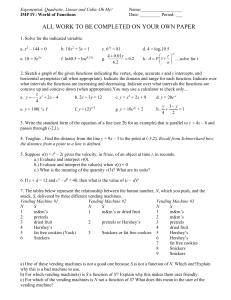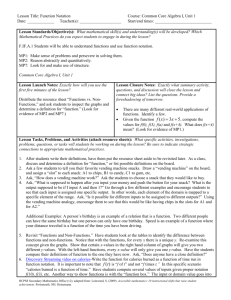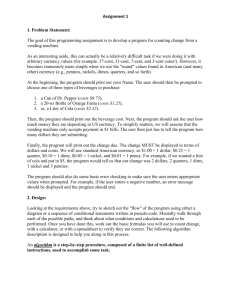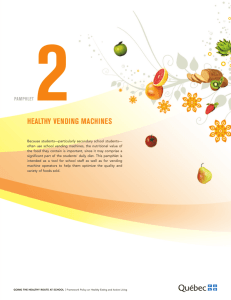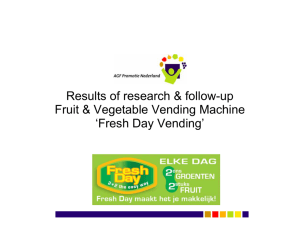2009 – 2010 Marketing & Sales Gap Analysis
advertisement
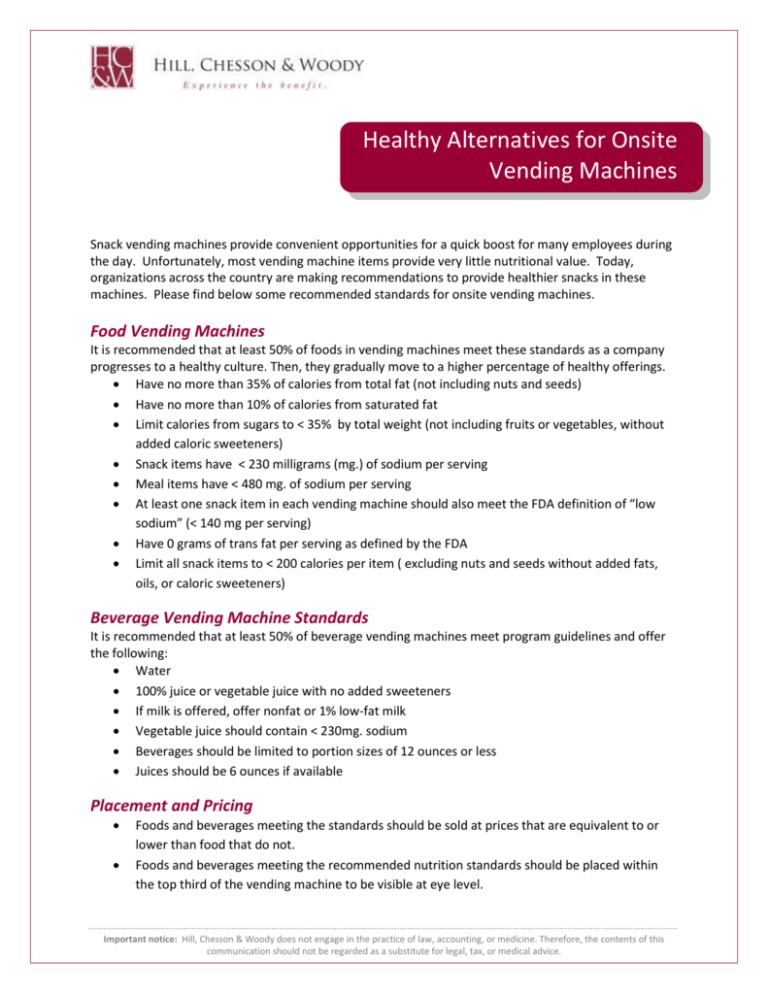
Healthy Alternatives for Onsite Vending Machines Snack vending machines provide convenient opportunities for a quick boost for many employees during the day. Unfortunately, most vending machine items provide very little nutritional value. Today, organizations across the country are making recommendations to provide healthier snacks in these machines. Please find below some recommended standards for onsite vending machines. Food Vending Machines It is recommended that at least 50% of foods in vending machines meet these standards as a company progresses to a healthy culture. Then, they gradually move to a higher percentage of healthy offerings. Have no more than 35% of calories from total fat (not including nuts and seeds) Have no more than 10% of calories from saturated fat Limit calories from sugars to < 35% by total weight (not including fruits or vegetables, without added caloric sweeteners) Snack items have < 230 milligrams (mg.) of sodium per serving Meal items have < 480 mg. of sodium per serving At least one snack item in each vending machine should also meet the FDA definition of “low sodium” (< 140 mg per serving) Have 0 grams of trans fat per serving as defined by the FDA Limit all snack items to < 200 calories per item ( excluding nuts and seeds without added fats, oils, or caloric sweeteners) Beverage Vending Machine Standards It is recommended that at least 50% of beverage vending machines meet program guidelines and offer the following: Water 100% juice or vegetable juice with no added sweeteners If milk is offered, offer nonfat or 1% low-fat milk Vegetable juice should contain < 230mg. sodium Beverages should be limited to portion sizes of 12 ounces or less Juices should be 6 ounces if available Placement and Pricing Foods and beverages meeting the standards should be sold at prices that are equivalent to or lower than food that do not. Foods and beverages meeting the recommended nutrition standards should be placed within the top third of the vending machine to be visible at eye level. Important notice: Hill, Chesson & Woody does not engage in the practice of law, accounting, or medicine. Therefore, the contents of this communication should not be regarded as a substitute for legal, tax, or medical advice. Marketing Strategies Promotional efforts such as labels and motivational signs on vending machines can increase awareness and selection of healthier foods and beverages. In addition, favorable pricing strategies can be an effective incentive for healthy eating. Use visible prompts in and on vending machines in the form of labels, stickers and posters to identify and promote healthy options. Offer healthy options at a lower price than unhealthy ones. Ideas for Healthy Vending Machine Options Non-refrigerated options o 100-calorie snack packs o 100% fruit leather o Animal crackers o Baked chips o Dried fruit o Fruit cup in 100% fruit juice o Graham crackers o Jerky o Low-fat granola bars o Nuts or seeds (plain or low-fat) o Pita chips o Popcorn ( fat-free or low-fat) o Pretzels o Protein bars (such as Luna or Cliff Bars) o Rice cakes o Soy crisps o Trail mix o Vegetable straws o Whole grain cereal (hot or cold with at least 3g of fiber and no more than 6g. of sugar) o Whole grain cereal bars o Whole grain crackers Refrigerated/frozen options o 100% fruit juice o 100% vegetable juice o Fat-free or low-fat cheese o Fresh cut vegetables and low-fat dip o Fresh fruit salad o Hard boiled eggs o Non-fat or 1% low-fat milk o Non-fat or low-fat cottage cheese o Non-fat or low-fat yogurt Important notice: Hill, Chesson & Woody does not engage in the practice of law, accounting, or medicine. Therefore, the contents of this communication should not be regarded as a substitute for legal, tax, or medical advice. o o o o o Non-fat or reduced-fat pudding Packaged fresh fruit slices Sandwiches made with lean meats and vegetables on whole grain bread Water Whole fresh fruit Sources Bay Area Nutrition and Physical Activity Collaborative http://www.banpac.org/healthy_vending_machine_toolkit.htm#Healthy_machines_schools Health and Sustainability Guidelines for Federal Concessions and Vending Operations http://www.gsa.gov/portal/content/104429 U.S. Department of Health and Human Services and U.S. Department of Agriculture, Dietary Guidelines for Americans , 2010 http://www.cnpp.usda.gov/DGAs2010-DGACReport.htm California Department of Public Health http://www.cdph.ca.gov/programs/cpns/pages/worksitefitbusinesskit.aspx Alliance for a Healthier Generation’s Vending Guidelines http://www.healthiergeneration.org/companies.aspx?id=2540 Fit Pick http://www.fitpick.org/ Nemours Health and Prevention Services, Healthy Vending Guide http://www.nemours.org/service/preventive/nhps/521an/onlineresource.html Important notice: Hill, Chesson & Woody does not engage in the practice of law, accounting, or medicine. Therefore, the contents of this communication should not be regarded as a substitute for legal, tax, or medical advice.
